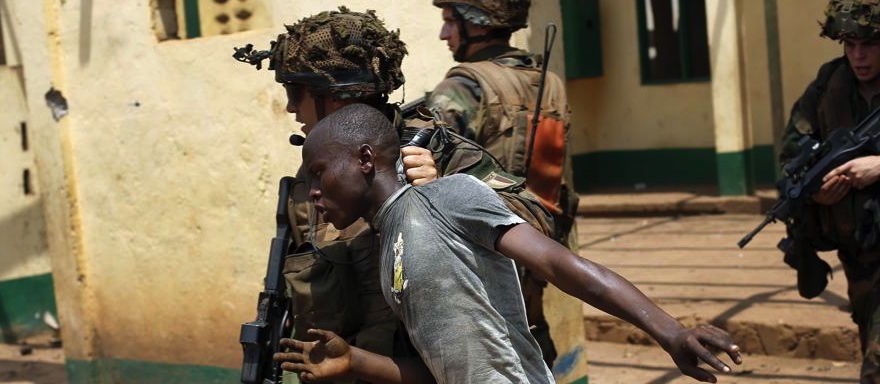The European Union has officially launched a military mission in South Sudan’s western neighbor, the Central African Republic, seeking to reinforce French and African forces already deployed to the country.
The 1,000-strong force, dubbed EUFOR RCA, will work to restore security to the capital Bangui during a six-month mission, with a view to handing over to a United Nations peacekeeping operation or African troops, the EU said.
EU foreign policy chief Catherine Ashton said the operation was meant to address the “huge challenges” facing Central Africa, where a crisis began a year ago when the mostly Muslim rebel group Seleka overthrew the government.
French President Francois Hollande, who has spearheaded efforts to secure international support for the mission, said on Tuesday that the security situation in the country had deteriorated into sectional violence targeting Muslims.
“The situation in Central Africa has improved in some respects and deteriorated in others,” he said after a meeting in Paris with the transitional CAR president, Catherine Samba Panza, on the eve of an EU mini-summit in Brussels on the situation.
Speaking alongside Samba Panza on the steps of the Elysee Palace, he highlighted “progress” by the transitional government in restoring public services and said: “It is courageous to take over control of a country that is currently in chaos and that has seen deadly clashes.”
EUFOR RCA — originally due to deploy in late March — was delayed by insufficient troop and aircraft commitments from the EU’s 28 member states.
It will operate in Bangui and its airport and cost an estimated 25.9 million euros ($40.6 million), the EU said. But the complete deployment of the force will take several weeks, a diplomatic source said.
“It is vital that there is a return to public order as soon as possible, so that the political transition process can be put back on track,” Ashton said in a statement announcing the deployment of the EU force.
Probe of Chadian killings
Highlighting the problems that have beset peacekeeping efforts so far, Samba Panza launched a probe on Tuesday into the killing in Bangui at the weekend of at least 24 people by Chadian peacekeepers.
“We have requested investigations be launched to establish exactly what happened” on Saturday, she said in Paris.
“As soon as we have those facts, we will see who was responsible for these incidents.”
Chadian troops had entered Bangui to repatriate compatriots who wanted to flee the chaos in the capital and opened fire in still-unclear circumstances.
According to local officials and witnesses, they fired rockets at civilian homes during a flare-up that left at least 24 dead and around 100 wounded.
The bloodbath was the worst known incident involving foreign troops since French and African peacekeepers deployed late last year.
Chad is a major power broker in the neighbouring CAR and its peacekeepers have been accused of bypassing the African peacekeeping force MISCA chain of command and protecting ex-Seleka fighters.
The MISCA force has said that on Saturday the Chadian troops opened fire in response to a grenade attack but residents denied it.
The incident has enraged Christians and prompted hundreds of Bangui residents to flee, fearing a wave of retaliatory violence.
“It appears that Chadian soldiers fired indiscriminately at a crowd following an incident,” Cecile Pouilly, spokeswoman for the UN human rights office, told reporters on Tuesday, stressing that her office was “still trying to confirm the exact affiliation of these soldiers”.
‘Won’t stand by and watch’
The UN refugee agency said on Tuesday it was prepared to help evacuate some 19,000 Muslims at risk of attack by mostly Christian “anti-balaka” fighters.
“What we don’t want is to stand by and watch people being slaughtered,” UNHCR spokeswoman Fatoumata Lejeune-Kaba told reporters in Geneva.
“The only thing keeping them from being killed right now is the presence of (international) troops.”
According to UNHCR numbers, 637,000 people in total are now displaced inside the country, including 207,000 in Bangui, while 82,000 mostly Muslim Central Africans have streamed into neighbouring countries in the past three months.
Anti-balaka militias have been accused of spearheading violence against Muslim communities in recent weeks.
They were formed last year in response to a coup in March 2013 by the mostly Muslim Seleka rebel group.
Seleka leader Michel Djotodia was installed as president, but was forced to step down in January under pressure from the international community, prompting violent retaliation from anti-balaka forces across the chronically unstable former French colony.
The peacekeeping forces in the country — around 2,000 French and 6,000 African troops — have meanwhile struggled to prevent what the United Nations has described as ethnic cleansing against the Muslim minority.
AFP
Photo: French forces grab a man looting in the Miskin district of Bangui, 3 February 2014 (AP/Jerome Delay)




